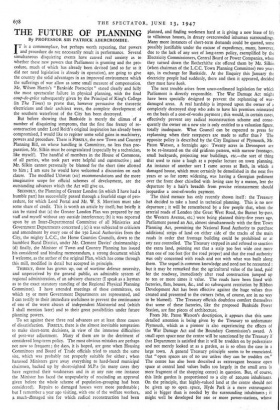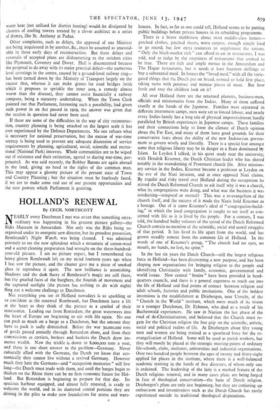THE FUTURE OF PLANNING
By PROFESSOR SIR PATRICK ABERCROMBIE,
IT is a commonplace, but perhaps worth repeating, that powers and procedure do not necessarily result in performance. Several simultaneous disquieting events have caused real anxiety as to whether these new powers that Parliament is granting and the pro- cedure, much of which has already been devised (and so far as it did not need legislation is already in operation), are going to give the country the solid advantages in an improved environment which the sufferings of war allow as some small measure of compensation. Mr. Wilson Harris's " Bankside Postscript " stated clearly and fully the most spectacular failure in physical planning, with the final coup-de-grace subsequently given by the Principal of King's College (in The Times) to prove that, however persuasive the theoretic electricians and their architect were, the, complete development of the southern waterfront of the City has been destroyed.
But before showing that Bankside is merely the climax of a number of disquieting symptoms, that the first fine frenzy of re- construction under Lord Reith's original inspiration has already been compromised, I would like to register some solid gains in machinery, powers and procedure. There is Framv, the new Town and Country Planning Bill, on whose handling in Committee, no less than pre- paration, Mr. Silkin must be congratulated (especially by a technician, like myself). The handful of members in the House of Commons, of all parties, who took part were helpful and constructive ; and Mr. Silkin cannot personally be blamed for the short time allotted to him ; I am sure he would have welcomed a discussion on each clause. The modified Uthwatt (sic) recommendations and the more imaginative scope for official schemes of development, are the outstanding advances which the Act will give -us.
SECONDLY, the Planning of Greater London (in which I have had a humble part) has successfully passed through a fourfold stage of pro- cedure, for which Lord Portal and Mr. W. S. Morrison must take some share of credit. This is worth an article by itself; but briefly it can be stated that (a) the Greater London Plan was prepared by my staff and myself without any outside interference; (b) it was reported upon by an Inter-Departmental Committee of all Ministries and Government Departments concerned ; (c) it was subjected to criticism and amendment by every one of the 15o Local Authorities from the City, the mighty L.C.C., the Home Counties Councils, down to the humblest Rural District, under Mr. Clement Davies' chairmanship ; (d) finally, the Minister of Town and Country Planning has issued his considered and binding memorandum, a strong document which I welcome, as the author of the original Plan, which has come through this mill, modified in detail but accepted in principle.
THIRDLY, there has grown up, out of wartime defence necessity, and unperceived by the general public, an admirable system of regional administration, of an advisory character (I speak as a layman as to the exact statutory standing of the Regional Physical Planning Committee). I have attended meetings of these committees, on which 15 or more Government Departments are represented, and I can testify to their immediate usefulness to prevent the continuance of one of the worst abuses of independent Ministerial zeal (which I shall mention later) and to their great possibilities under future planning powers.
To set against these three real advances are at least three causes of dissatisfaction. Frasmv, there is the almost inevitable temptation to make short-term, decisions, in view of the immense difficulties of post-war adjustment. Many of them are to the detriment of considered long-term policy. The most obvious mistakes are perhaps not now so frequent ; the days, it is hoped, are gone when Housing Committees and Board of Trade officials tried to snatch the same site, which was probably not properly suitable for either ; when harassed Ministers gave away everything to hard-faced municipal chairmen, backed up by short-sighted M.P.s (in many cases they have regretted their weaknesses and in at any rate one instance the Minister has faced the unpopularity of rescinding an approval given before the whole scheme of population-grouping had been considered). Repairs to damaged houses were more pardonable ; but I remember a year ago visiting, with one of the welfare workers, a much-cffunaged site for which radical reconstruction had been planned, and finding workmen hard at it giving a new lease of life to villainous houses, in dreary overcrowded inhuman surroundings. Many more instances of short-term demands could be quoted, some possibly justifiable under the excuse of expediency, many, however, due to the lack of any sort of long-term policy, exemplified by the Electricity Commissioners, Central Board or Power Companies, when they turned down the Rotherhithe site offered them by-Mr. Silkin (when chairman of the L.C.C. Town Planning. Committee) two years ago, in exchange for Bankside. At the Enquiry this January the electricity people had suddenly, there and then it appeared, decided they must have both.
The next trouble arises from unco-ordinated legislation for which Parliament is directly responsible. The War Damage Act might have been specially designed to prevent the replanning of war- damaged areas. A real hardship is imposed upon the owner of a completely destroyed shop who asks to have his premises reinstated on the basis of a cost-of-works payment ; this would, in certain cases, effectively prevent any radical reconstruction scheme and conse- quently the owner on a new site is only entitled to a valuation figure, totally inadequate. What Council can be expected to press for replanning when their ratepayers are made to suffer thus ? The opposite policy is described by the City Engineer of Plymouth, Mr. Paton Watson, a fortnight ago : Twenty acres in Devonport are to be re-instated on the old gridiron pattern, with narrow frontages, small backyards, projecting rear buildings, etc.—the sort of thing that used to raise a laugh at a popular lecture on town planning. An instance of another sort I came across at Bath, in which a damaged house, which must certainly be demolished in the next five years or so for street widening, was having a Georgian pediment over the front door chiselled with loving care by a mason, lest the departure by a hair's breadth from precise reinstatement should jeopardise a cost-of-works payment.
The third menace has only recently shown itself : the Treasury has decided to take a hand in technical planning. This is no new departure ; it will be remembered by a few people that, when the arterial roads of London (the Great West Road, the Barnet by-pass, the Western Avenue, etc.) were being planned thirty-five years ago, Parliament passed an Act, almost simultaneously with the first Town Planning Act, permitting the National Road Authority to purchase additional strips of land on either side of the tracks .of the main roads in order that frontage building could be prohibited or at any rate controlled. The Treasury stepped in and refused to sanction the extra land, pointing out that a strip 30o feet wide cost more than one of too feet (for the road proper) and that the road authority was only concerned with roads and not with what was built along them. The sequel is common knowledge and need not be recounted ; but it may be remarked that the agricultural value of the land, paid for the roadway, immediately after road construction jumped up to ten or more times it value. The roads have been lined with factories, flats, houses, &c., and no subsequent restriction by Ribbon Development Act has been effective against the huge values thus created and presented to the owners (who, of course, are in no way to be blamed). The Treasury officials doubtless comfort themselves that some of these factories, like the proposed Bankside Power Station, are fine pieces of architecture.
From Mr. Paton Watson's description, it appears that this same detailed attention is being given by the Treasury to unfortunate Plymouth, which as a pioneer is also experiencing the effects of the War Damage Act and the Boundary Commission's award. A small open space near the centre will be sanctioned by the Treasury if that Department is satisfied that it will be trodden on by pedestrians and not merely looked at as a garden, as is so often the case in a large town. A general Treasury principle seems to be enunciated, that " open spaces are of no use unless they can be trodden on." The centre has also been described as extravagant because open space at central land values bulks too largely_ in the small area (a mere fragment of the shopping centre) in question. But, of course, this little garden is proportioned to a city of zoo,000 inhabitants. On the principle, that highly-valued land at the centre should not be given up to open i space, Hyde Park is a mere extravagance and is bigger than is needed by the surrounding inhabitants ; it might well be developed for one or more power-stations, whose
waste heat (not utilised for disrtict heating) would.be dissipated by clusters of cooling towers treated by a clever architect as a series of domes, like St. Anthony at Padua.
Other complaints, such as delays, the approval of one Minister not being acquiesced in by another, &c., must be assumed as unavoid- able in these early days of reconstruction. But these delays and reversals of accepted plans are disheartening to the stricken cities like Plymouth, Coventry and Dover. Hull is discontented -because the proposal to do away with its major practical defect—the numerous level crossings in the centre, caused by a ground-level railway has been turned down by the Ministry of Transport largely on the excuse that, whereas it can make grants for road bridges (with which it proposes to sprinkle the inner area, a remedy almost worse than the disease), they cannot assist financially a railway company, being a statutory. undertaking. When the Town Clerk pointed out that Parliament, foreseeing such a possibility, had given suds power in an Act passed in 1919, the answer was given that the section in question had never been used.
If these are some of the difficulties in the way of city reconstruc- tion, country planning is being attacked on the largest scale it has ever experienced by the Defence Departments. No one refuses what is necessary for national preservation, but the excuse of war-time secrecy is being used to prevent any adequate discussion of service requirements by planning, agricultural, social, scientific and recrea- tional (National Park) interests. Whole communities are to be wiped out of existence and their extinction, agreed to during war-time, per- petuated. As was said recently, the Robber Barons are again abroad in the land, giving no heed to the rights of the common man. This may appear a gloomy picture of the present state of Town and Country Planning ; but the situation must be fearlessly faced, if we are to make some real use of our present opportunities and the new powers which Parliament is granting.



































 Previous page
Previous page